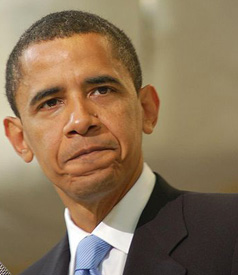
|  |  |  Americas & Beyond Americas & Beyond  
Obama Caves on Bush Tax Cuts
 Nadia Prupis - t r u t h o u t Nadia Prupis - t r u t h o u t
go to original
December 07, 2010


| | President Barack Obama. (Elizabeth Cromwell) |  |
President Obama announced on Monday that he had reached a deal with Republicans to extend tax cuts for all Americans, including the wealthiest two percent - backtracking on one of his most pivotal campaign promises. Calling the deal a "framework for a bipartisan agreement," Obama relented in his previous assurances that he would allow Bush tax cuts to end and acceded to Republican opponents.

Obama's statement follows weeks of negotiations between political parties on whether to extend or retire Bush-era policies on income and estate tax. A Democrat-sponsored bill that would have extended tax cuts for workers earning less than $250,000 also died in the Senate during a Republican filibuster. The final compromise, Obama said, was a necessary step to help the economy recover and avoid punishing middle-class families for a political battle.

"I'm not willing to let working families across this country become collateral damage for political warfare here in Washington," Obama stated. "And I'm not willing to let our economy slip backwards just as we're pulling ourselves out of this devastating recession."

If the bill passes, 10.5 million low- and moderate-income families will keep their cuts through the Earned Income Tax Credit, while the American Opportunity Tax Credit will help eight million students continue to pay for their college education. The bill would also secure 13 months of unemployment insurance for two million Americans.

The Making Work Pay Tax Credit, meanwhile, has been replaced with payroll tax cuts that would lower workers' Social Security payments by two percent for the next year, decreasing from 6.2 to 4.2 percent in 2011.

In a press conference call before the announcement, senior White House officials said the payroll tax cuts would provide $120 billion in relief and is one of the "higher impact" methods of stimulating the economy. During his statement confirming the compromise, Obama said that "economists across the political spectrum agree [it] is one of the most powerful things we can do to create jobs and boost economic growth."

Some opponents of the Bush tax cuts did not hesitate in expressing their disapproval of the compromise. Immediately following the announcement, Sen. Bernie Sanders (I-Vermont) called the plan an "absolute disaster."

Stay informed with free Truthout updates delivered straight to your email inbox. Click here to sign up.

"Millionaires and billionaires do not need huge tax deductions. That's the simple truth," Sanders said in an interview with MSNBC's Ed Schultz. "If it turns out in this deal to be two years, you can bet that that's just the beginning. It will be extended beyond that ... I will do whatever I can to see that sixty votes are not acquired to pass this piece of legislation."

Senate Majority Leader Harry Reid (D-Nevada) spokesman Jim Manley issued a neutral statement to reporters, saying, "Now that the President has outlined his proposal, Senator Reid plans on discussing it with his caucus tomorrow."

Speculation over potential compromises abounded in recent weeks. Paul Krugman of The New York Times strongly opposed any extension of the Bush tax cuts, even if it came with a "temporary" label.

"Right now, the Republicans see themselves as successful blackmailers, holding a clear upper hand," Krugman wrote in a December 5 piece. "They might agree to a two- or three-year extension - but only because they believe that this would set up the conditions for a permanent extension later. And they may well be right: if tax-cut blackmail works now, why shouldn't it work again later?"

A TV ad created by the Progressive Change Campaign Committee showed footage of Obama speaking during his election campaign on May 29, 2007, in Iowa City, stating that he would "allow the temporary Bush tax cuts for the wealthiest Americans to expire."

The New York Times also pointed out Obama's statement during an April 2008 interview with Fox News that he would "roll back the Bush tax cuts on the wealthiest Americans back to the level they were under Bill Clinton."

Obama acknowledged during his speech on Monday that "everyone will find something in this compromise that they don't like," but stopped short of recognizing that the move breaks another of his campaign promises.

"Sympathetic as I am to those who prefer a fight over compromise, as much as the political wisdom may dictate fighting over solving problems, it would be the wrong thing to do," Obama said. "It's not perfect, but this compromise is an essential step on the road to recovery."

White House officials took a more positive approach, calling the proposal "an excellent deal." Officials also insisted that the tax cuts are a temporary measure and will serve as a "central part" of the 2012 presidential debates, but did not say whether they will be similar to the 2008 debates on the same issue.

If the plan is not approved by Congress, taxes will increase across the board on January 1. Looming deadlines for other priorities, including ratification of the New Start treaty with Russia, passage of the DREAM Act and repeal of "don't ask, don't tell" are also at risk if the tax impasse is not resolved.
|

 |
|  |



